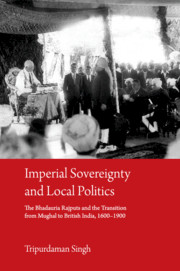 Imperial Sovereignty and Local Politics
Imperial Sovereignty and Local Politics Book contents
- Frontmatter
- Dedication
- Contents
- Acknowledgements
- List of Abbreviations
- Note on Transliterations
- Glossary of Commonly Used Indian Words
- Introduction
- 1 Integration into the Mughal System
- 2 Decline of the Mughals, Emergence of the Marathas
- 3 The Maratha Supremacy
- 4 The Rise of the Company Bahadur and the British Raj
- 5 The Uprising, the Bandit and Pax Britannica
- Conclusion
- Appendices
- Bibliography
- Index
Conclusion
Published online by Cambridge University Press: 26 April 2019
- Frontmatter
- Dedication
- Contents
- Acknowledgements
- List of Abbreviations
- Note on Transliterations
- Glossary of Commonly Used Indian Words
- Introduction
- 1 Integration into the Mughal System
- 2 Decline of the Mughals, Emergence of the Marathas
- 3 The Maratha Supremacy
- 4 The Rise of the Company Bahadur and the British Raj
- 5 The Uprising, the Bandit and Pax Britannica
- Conclusion
- Appendices
- Bibliography
- Index
Summary
At the outset, this book set out with two interlinked aims. The first was to examine the development of political relations between the Bhadauria clan and the dominant powers, and to do so while keeping the Bhadawar locality at the centre of the narrative. The second was to analyse the processes through which such a relationship was built and articulated within the context of changing conceptions of sovereignty and authority. In such an analysis, the study of the way symbolic and ritual links was constituted and connected to the instrumental, and indeed how they created a conceptual or symbolic realm, was paramount.
Through the preceding chapters, the study of this process has sought to explore the nature of state formation and the constitution of sovereignty as reflected in the Bhadauria relations with the dominant powers. The conceptualisations of power and the practices of sovereignty not only delineated the political terrain, but as this book has argued, they also offered the means through which political relations, and the formation of the state itself, were negotiated and structured. The instrumental links between the Bhadaurias and the dominant powers such as rights of land, taxation and revenue and access to imperial power structures were only a reflection of the non-instrumental links between the centre and the locality, given visible form through acts such as grants of titles and legitimation of successions. Treating this relationship as an example, we make the case for the centrality of the symbolic processes in stabilising the imperial state's sovereignty and its relationship with the locality in 18th and 19th century India.
In terms of its structure, methodology and subject matter, certain limitations of the study need to be acknowledged before the book progresses to its conclusions. The first indeed is the chronological scope and longue dúreéview of the project. Although, in order to understand the long-term process of state formation, social and political change, such a long-term analysis becomes necessary, yet, to pack analysis worth of 300 years of history involves striking a necessarily arbitrary balance between width and depth. Second, the extrapolation of broader trends and arguments from events and processes in a localised setting and group and the linking of such processes to broader macro-historical arguments come with its own questions of how general an opinion can be drawn.
- Type
- Chapter
- Information
- Imperial Sovereignty and Local PoliticsThe Bhadauria Rajputs and the Transition from Mughal to British India, 1600–1900, pp. 200 - 213Publisher: Cambridge University PressPrint publication year: 2019


